What Justin Trudeau lost by losing his cool
What a Parliament Hill elbowing means for the much more serious matters of assisted death and electoral reform in a fractured House
Macleans Magazine’s Ottawa and Montreal bureau head shots at Third Floor York studio in Ottawa December 12, 2013.
Photo by Blair Gable
Share
The signature moments in a political life most often arrive when the politician says something that sticks. “Just watch me,” Pierre Elliott Trudeau famously recommended, and he was worth keeping an eye on, shrugging and pirouetting and striking gunslinger poses. But mostly we listened; his words mattered more. Often it’s not just the memorable phrases that stay with us, but the vocal instrument itself. Brian Mulroney’s viscous baritone was precisely the right delivery system for his grandiloquence. Jean Chrétien’s rasp scraped away affectation and left only what needed hearing.
But Justin Trudeau, so far, has been less about words, less about voice, than about a highly mobile, virally watchable, physical presence on the national stage. Sure, he’s offered up a few decent one-liners (“Because it’s 2015”) and borrowed from Sir Wilfrid Laurier (the catch-all catchphrase “sunny ways”). He has, however, left his most vivid impressions, not by saying, but by doing. Punching out a senator in a charity boxing match, or balancing babies on one hand. All but waltzing in rolled-up shirtsleeves through adoring throngs on the campaign trail, or gliding into the White House’s East Room, impeccably tuxed, for a state dinner.
So there was a sort of visual dissonance in the sight of him—shown countless times on TV and now infinitely online—doing what he did in the House of Commons last week. Picture that spectacle again, but this time in contrast to one of the scenes he’d starred in before. The long, loose gait of his triumphant walk up that sunlit lane to Rideau Hall to be sworn in as PM last fall, for instance, morphs into an awkwardly stiff stride as he rushes across the aisle of the House. He grasps Tory House leader Gordon Brown brusquely by the arm and ushers him unceremoniously to his seat. Along the way, no doubt inadvertently, he clumsily elbows NDP MP Ruth Ellen Brosseau aside.
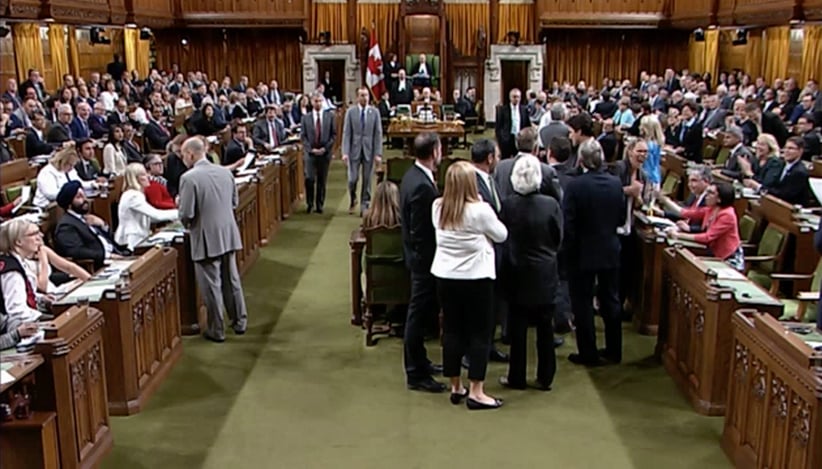
It would have been a graceless performance from any prime minister, though not a single one of Trudeau’s 22 predecessors is on record as having done anything remotely similar. But from a PM whose image is based to such an extent on the smooth way he pilots his tall, fit form through any tableau, the sequence was downright jarring. There’s a thin line between “youthful” and “immature,” and Trudeau crossed it the moment he decided to rise from his seat, eyes fiercely fixed on Brown, to try to single-handedly bring an end to what amounted to merely a routine bit of opposition delaying before a House vote could begin.
Within hours, perhaps minutes, the question of what his loss of self-control meant was being hashed over obsessively. While there was room for a range of reasonable reactions, the most outraged responses came off as more than a little unhinged. NDP MP Niki Ashton denounced the elbowing of Brosseau as the “furthest thing from a feminist act,” as if it erased Trudeau’s credentials as the first prime minister to appoint an equal number of women and men to his cabinet. Adopting the inevitable parlance of pop psychology, Conservative MP Candice Bergen offered this diagnosis: “He has anger issues and he needs to figure out how to control them.”
Another Tory MP, Mark Warawa, cast the incident less in terms of Trudeau’s loss of personal control, than as an extension of the Liberal imposition of political control, citing an ominous pattern of “domineering and dictatorial approaches.” If this wasn’t just Trudeau’s lapse—if his actions somehow revealed the way his government really functions—how long and dark a shadow might this moment be imagined to cast? Conservative MP David Sweet took that line of argument to its absurd extreme. “When the Prime Minister behaves in a fashion like he did yesterday,” Sweet declared in debate the next day, “it stains the institution, it stains us, and it stains every Canadian.”
Let it be stipulated that every Canadian need not worry about being marked by Trudeau’s embarrassment. Almost as quickly as over-the-top interpretations of his actions were aired, more measured readings were being recorded in Hansard. “What took place [on May 18] was inadvisable, but to call it gender-based violence, to make exaggerations and misrepresentations about the nature of the incident, is really irresponsible and wrongful,” Liberal MP Ginette Petitpas Taylor said in the House. “It does not help us take the culture in this place where it needs to be, and it does a disservice to victims of violence.”
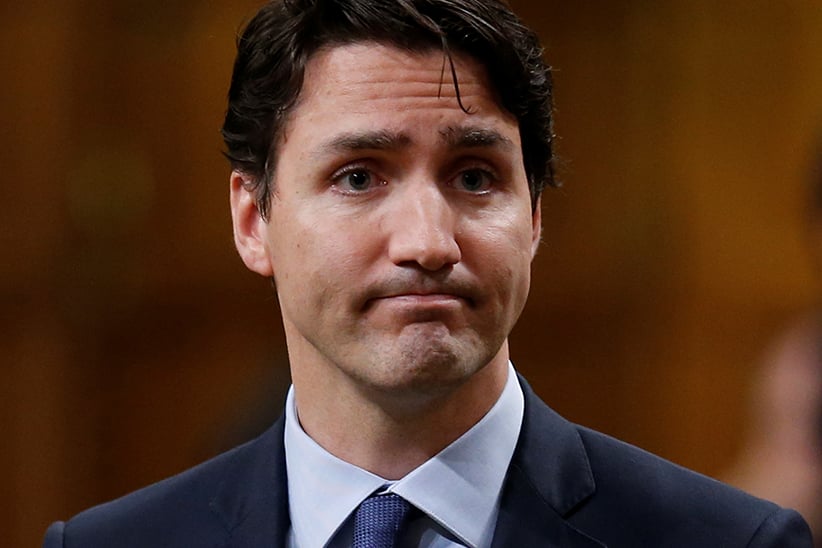
It wasn’t only Liberals who tried to dial down the umbrage. After Trudeau apologized repeatedly for laying hands on Brown and knocking into Brosseau, some opposition MPs also proposed moving on. “We seem to be undermining even the heartfelt apology by the Prime Minister, who has admitted that his behaviour was untoward in this place and against the recognized rules of the House,” said NDP MP Linda Duncan. “I am starting to feel uncomfortable that not all members agree and have not accepted the Prime Minister’s apology.”
She meant, in fact, mainly Conservative MPs. The overall tone from the NDP was less unequivocally condemnatory. In fact, NDP MP Charlie Angus, who is often counted among the more respected voices in the House, said Trudeau’s actions, while wrong, resulted in part from annoyingly petty tactics that all parties needed to rethink. “I am not going to excuse his behaviour, but we have to go back to the disintegration of what is happening in this House and talk honestly about how to get forward,” Angus said. “When we go to these tit-for-tat procedural wars, the fundamental trust breaks down, and people end up doing things that they will regret.”
His reference to procedural wrangling in the House brings what was an eye-widening moment to its eye-glazing counterpoint. For most Canadians, House rules and regulations, and the manipulation of them by the parties, are boring. Still, those tactics matter in this case. The two weeks leading up to Trudeau’s most flagrant mistake to date in office were marked by rising bad feeling over, in particular, his government’s management of Bill C-14, the highly sensitive legislation that would allow physicians to help patients suffering “grievous and irremediable” illnesses end their lives, as required by a landmark Supreme Court of Canada decision handed down last year.
The Liberals face a serious challenge trying to move Bill C-14 through the House in time to satisfy the court’s requirement that a medically assisted dying law be in place by June 6. MPs in all parties are deeply divided on the details of the bill, and on the underlying philosophical and religious issues surrounding suicide. As well, whenever the House gets through debating Bill C-14, the government must somehow coax the Senate into passing it swiftly. Asked how much time senators need, Trudeau’s new top representative in the upper chamber, Sen. Peter Harder, said dryly: “It can be done in whatever time frame the Senate collectively views appropriate for its consideration and due process.”
In other words, don’t hold your breath. Facing delays beyond their control in the Senate, Trudeau and his parliamentary lieutenants foolishly overreached in trying to manage what, with a big majority, they supposed they could: the House. The Liberals proposed a set of unprecedented rules—labelled Motion No. 6—to strip the opposition of time-honoured procedural tools, which would normally allow them to somewhat slow the progress of any bill. Among other measures, Motion No. 6 would have let cabinet ministers force MPs to debate through the night, and taken away the opposition parties’ say in when the House would break for the summer.
On the day after Trudeau’s flustered foray across the aisle onto opposition turf, the Liberals withdrew Motion No. 6, in a humbling bid to make peace with the opposition parties, and signal contrition. Most Canadians, understandably, wouldn’t have seen that as a big deal. On Parliament Hill, though, it mattered. Indeed, NDP MP Peter Julian went so far as to characterize the withdrawing of the motion as the end of “the most draconian power grab that any government has ever attempted in Canadian history.”
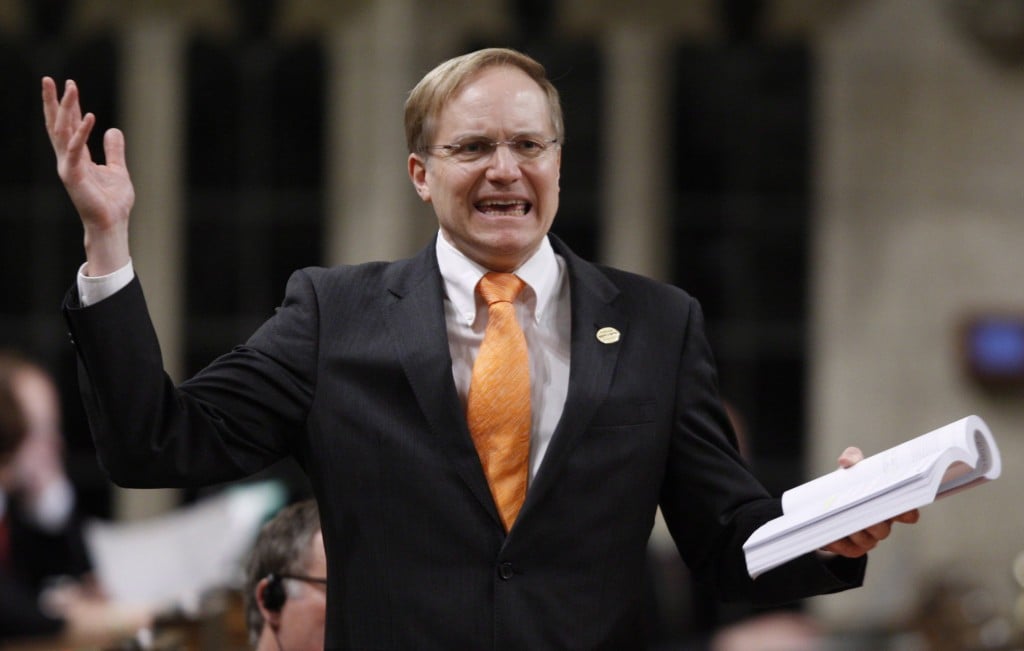
Julian is the NDP House leader, a position that carries weight on the Hill and barely registers off it. Each party has one; they meet regularly to discuss how the House business will be managed, including how long bills will be debated. The Conservatives’ is Andrew Scheer, who served as Speaker, the House’s enthroned referee, during the Stephen Harper era. The Liberals’ is Dominic LeBlanc, veteran New Brunswick MP and Trudeau’s childhood friend. The unseen interactions among these three will be crucial in the coming weeks, when management of C-14, and other issues, might signal the tone Trudeau can expect in the Commons until the next election.
LeBlanc declined to be interviewed for this story. Julian summed up the challenge for the Liberals as a fundamental matter of attitude. “The government has to stop thinking of itself as having to control everything,” he said. Scheer said Trudeau showed, in that telling moment last week, that he harbours an inflated sense of his own ability to make a decisive impact in almost any situation. “I just think of the look that came over his face—‘I’m going to take it upon myself to fix the perceived wrong that I see here,’ ” Scheer said. “That’s what’s so bizarre.”
There was also some surprise, among veteran MPs, that Liberals allowed Trudeau to act so recklessly. “There’s a convention we have in the House: We protect each other,” Julian said. “If there’s a New Democrat that is heading off across the way, I’m going to stop them. It hasn’t happened too often, but occasionally I’ve had to say, ‘Nope, don’t do that.’ Mr. Trudeau came across twice; nobody from the Liberal caucus did as much as halt him for a moment.”
The tribal code of parliamentarians about their behaviour in the House naturally differs from what the public sees. As far as their government’s image in the eyes of ordinary Canadians goes, some Liberals voiced private concern that Trudeau had squandered, in a moment’s loss of composure, much of their claim to having ushered in a new era of civility in Ottawa, after the acrimony of the Harper era.
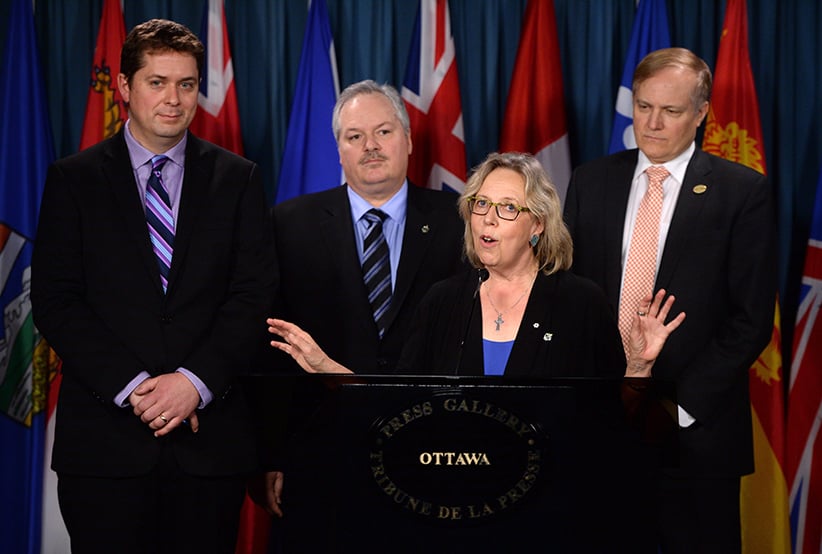
Green Leader Elizabeth May credited the Liberals with having made genuine progress on that front—until a couple of weeks ago. She pointed to question period, where Liberal cabinet ministers might not be giving direct answers in all cases, but at least they haven’t been resorting, as Harper’s front bench so often did, to responding to questions with partisan attack lines barely related to the topic at hand.
And it’s not that the Liberals, according to May, have been getting an easier ride. On the contrary, she suggests the thickness of Trudeau’s skin has been tested more relentlessly than Harper’s was. “No matter how exercised the opposition was when Stephen Harper was prime minister, there was never loud heckling while he was speaking,” she told Maclean’s. “There was the occasional shout of something in response, but generally, there wasn’t a disrespectful, constant heckling.”
Still, May says the Liberals made the “huge mistake” of trying to circumvent legitimate opposition to their assisted-dying legislation, an emotionally fraught and divisive topic with profound consequences. “I think it was a miscalculation,” she said. “That may be an overly charitable way of describing it.”
As she describes it, the week leading up to Trudeau’s aisle-crossing debacle was a series of escalating retaliatory moves in the House. For instance, she says an NDP member rose to make a routine request for permission to share his speaking time—a common House practice—and the Liberals shut him down. “I’ve never seen unanimous consent denied for splitting time,” May said. “That was the signal for me that things had gotten extremely bad.”
The best possible outcome for Liberals of Trudeau’s un-prime-ministerial moment would be if it served to release pent-up partisan pressures in the House. Compelled in the aftermath to make more judicious use of their majority clout, the Liberals might actually find themselves managing the place better. Certainly, some of the comments from the NDP MPs and May suggest they have potential working partners on the opposition benches, although conciliatory sentiment is in much shorter supply among the Tories.
Beyond Bill C-14, though, a potentially even more divisive issue looms large as a source of dysfunctional fractiousness on Parliament Hill in the coming months: electoral reform. Of all Trudeau’s policies, his vow to end the traditional “first past the post” system for electing MPs arouses the deepest anxieties. In last year’s Liberal platform, Trudeau pledged that if he became prime minister, the 2015 election would be the last one conducted the traditional way, with the local candidate who got the most votes going to Ottawa and the rest getting nothing.
Martin Patriquin: How the Liberals turned electoral reform into a pointless slo-mo train crash
Conservatives and New Democrats alike fear Trudeau will impose a new voting system that benefits the Liberal party. Soon after he behaved so badly on the floor of the House, they began trying to link the mindset he betrayed in that moment to the attitude behind his electoral-reform push. Earlier this month, his government announced that a special parliamentary committee—dominated by a majority contingent of Liberal MPs—would study electoral-reform options. The NDP had argued that, when it comes to changing the way Canadians vote, the Liberals should have voluntarily surrendered the power to use their majority, requiring them to find opposition allies for any reform proposal.
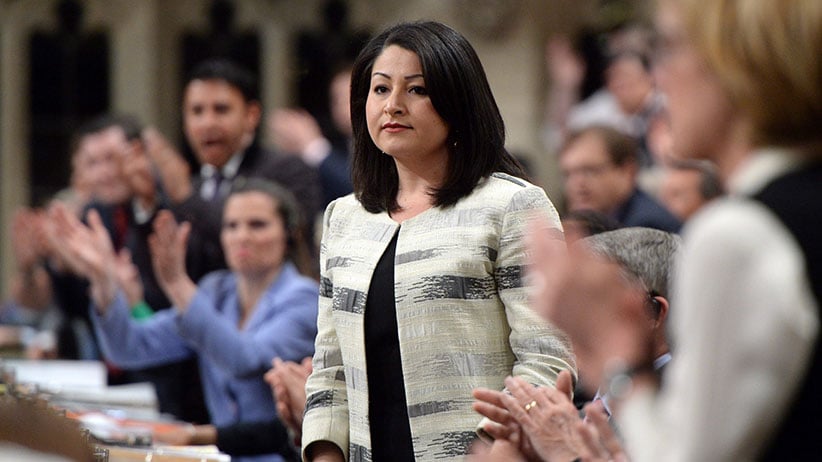
The Conservatives used much of the first question period after the uproar on the House floor to press Democratic Institutions Minister Maryam Monsef on the electoral-reform process. Their key demand: a referendum on whatever proposal emerges from the committee process and other consultations. Trudeau doesn’t like that idea. Not surprisingly, Monsef—whose chipper unflappability is starting to get under the skin of opposition MPs—didn’t crack under Tory grilling.
Monsef and LeBlanc gave the committee only seven months to report back with proposals for a new way to vote. The main options include proportional representation (PR) and preferential balloting. Under various types of PR, the number of votes a party gets would be better reflected in its share of House seats; it’s the system long favoured by the NDP and Greens. A preferential balloting system would likely ask voters to rank candidates, with their second and third choices being counted only if their first-choice candidates were dropped due to lack of support. Ranked balloting tends to reward centrist parties, so wary opposition MPs suspect that’s where the Trudeau Liberals are leaning.
The fight over electoral reform is shaping up to be a bitter one. What it lacks in the ethical depth of assisted dying, it makes up for in high-stakes implications for the future prospects of parties winning power. As long as the Liberals leave open the possibility that they will use their majority to ram through the reform they like best, lasting de-escalation of Hill tensions is unlikely. “When you have a majority government, particularly one that feels incredibly self-confident, as the current Liberal government does, then bad things happen,” Julian said.
That’s a partisan’s perspective, of course. For most Canadians, seeing Trudeau acting as his own enforcer might have been riveting, but not definitive. Polling firm Abacus Data found 71 per cent said it had no impact on their opinion of him, while 23 per cent said they thought less of him—and six per cent liked him better. A rolling weekly poll by Nanos Research found 68.8 per cent of Canadians saw Trudeau as having the qualities of a good leader last week, up a shade from the week before his temper got the better of him. “People will take an interest in this, for sure,” said pollster Nik Nanos. “But will it change their perceptions? Likely not. For that, they look for a pattern of behaviour, and this particular instance is contrary to the pattern of behaviour they would expect from Justin Trudeau.”
—with Shannon Proudfoot